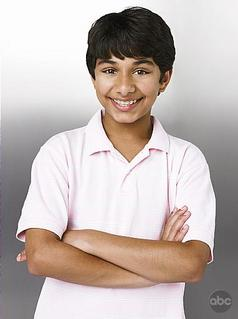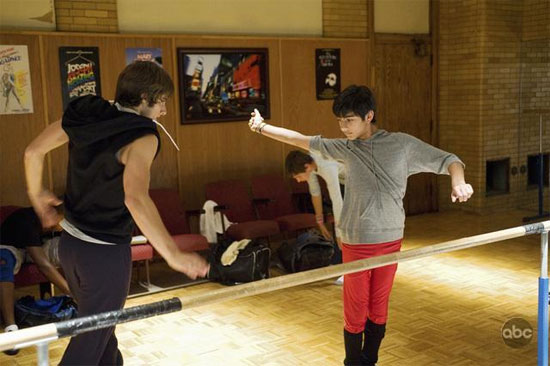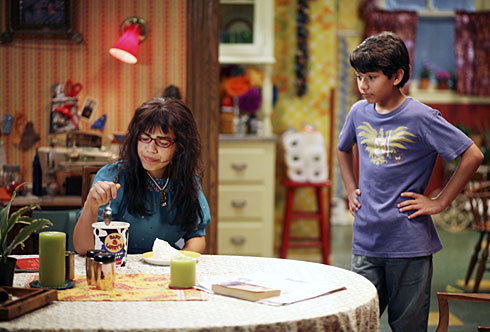Queering Justin
by: Hector Amaya / Southwestern University

Mark Indelicato as Justin in Ugly Betty
Just type in “Justin” and “Ugly Betty” into a search engine and you will find hundreds of digital spaces where this secondary character is being discussed by a range of communities that include general fans of the show, Latinos, the press, and queer communities. Although America Ferrara is the unquestioned star of the show, Mark Indelicato’s performance as Justin has become a point of conversation and a growing reason to watch the show, establishing the possibility for fandom across communities. If Ugly Betty bet its success on the possibility of ethnic and racial crossovers (Latinos, African Americans, Asian Americans and Anglos are all invited and represented), Justin’s character is also delivering a sexual crossover. He is special. And he is visible.
How many secondary characters are the central focus of newspaper articles in the LA Times (Jan. 31, 2007), USA Today (Feb. 8, 2007) and Chicago Tribune (Nov. 16, 2006)?
Justin is perhaps the most radical Latino representation in television today. He is a young brown boy, growing up working-class in Queens, NY, who performs his gender in a disruptive, excessive, intertextual fashion. Take this scene from Season 1, Episode 5
The Halloween episode begins with Justin coming down from his room, dressed as a sailor and quite ready to perform as Gene Kelly in On the Town (1949, Stanley Donen and Gene Kelly). Justin’s exuberant rendition of Kelly’s tap dance is gender bending at its best. Not surprisingly, the debates on the blogsphere are about whether he is queer, gay, or simply happy to love fashion, musicals, and the theatre. Considering the narrow ways in which Latino masculinity is constructed in America-if I hear the term Latino and macho in the same sentence again I shall faint-Justin’s disruption of gender norms is a refreshing reminder of the possibility to narrativize Latino males in both entertaining and complex ways. I am a fan.
As a scholar, one thing fascinates me: most of the discussions that are going on about Justin, which include declarations by producer Silvio Horta, chatter in television and queer communities, interviews with Indelicato himself, point to the careful way in which Justin’s sexuality is being managed. The problem is this: Justin is twelve, and at that age he would be the youngest gay character in television. In addition, because gayness has been discursively constructed as a sexual identity that implies sexual activity, if gay, Justin would have to be one of the youngest sexual actors in television (outside of narratives of abuse). The issue of Justin’s sexual identity is tricky. How to manage it?

Justin
Horta, the Cuban-American-gay executive producer, is careful to point out that Justin, at twelve, is a pre-pubescent boy whose behavior should be interpreted as gender, not sexual, performance . Thus, Justin’s infatuation with musicals and fashion should not be read as sexual behavior, which, Horta proposes, should be linked to hormones. Absent hormones, viewers ought to see Justin’s behavior as evidence of gender bending. Although this approach by the producer should not be surprising, given the potential risks for flack associated with portraying an openly gay 12-year old boy, similar explanations of Justin’s behavior can be found in the blogsphere, where fans have debated whether Justin should be call gay or simply “different.” Some side with Horta, and believe that he is not gay because he is too young. Others think that Justin is gay, thus crossing the line between gender and sex. Even in these cases, Horta’s style of biologically defining gayness is part of the discourse around Justin. Fans may acknowledge that Justin is gay, but they recognize that this ascription is at the moment based on gender, not sex. However, it remains a matter of time. These fans tend to see Justin’s biological homosexuality as practically inevitable. Many are discussing when the coming-out story will happen, taking for granted Justin’s evolution as a sexual being attracted to other boys.
What fascinates me is how through both the official explanation of Justin’s behavior and taste (exemplified in Horta’s position) and the queering of his future, Justin’s present is understood as asexualized because of biology. He is either not gay because he is not pubescent (Horta), or he is not yet gay because we are yet to witness his sexual attraction toward other boys (most fans’ position). In these instances, sexuality is understood narrowly as sexual behavior directed toward others, or sexuality is understood as behavior regulated by reproductive biology, with biology circumscribed to the pubescent hormonal rush. These ways of thinking about sexuality can serve dangerous purposes. One, they deny children’s sexuality, a position contrary to knowledge coming from medicine, biology, and developmental psychology. Most famously, the work of Freud and Kinsey sustain that sexuality and desire are normal elements of childhood. Second, by linking sexual behavior to pubescent gland activity, they vindicate the notion that heterosexuality and homosexuality should be understood in relationship to procreation. This in turn reproduces the notion that desire is hormones, a boorish position that belies the important insight that desire is always socially constructed. Lastly, the many commentators on Justin’s development err on assuming a person his age is pre-pubescent, most research placing it between ten and eleven.

Betty and Justin
All of these little errors of fact are not coincidental. They are culturally constructed and do their part at reconstituting our current system of sex and gender. They are part of the mental schemas that we use to think sexuality and gender and are clearly limited. These schemas tell us that masculinity and femininity are the product of biological determinants. As many researchers of sexuality have pointed out, this has led to the common assumption that because sexuality is linked to biology, it is thus not cultural. Accordingly, male behavior, including violence, rape, competitiveness, and promiscuity, are often explained in relationship to testosterone, thus exonerating patriarchy. This same hormonal schema informs the supposition that most children in television are heterosexual, although we never see them acting as sexual beings. All we see, or want to see, is gendered behavior. This is the same schema used by fans who think that Justin is not yet gay, but will become gay. Curiously, this assumption rests on Justin having exhibited cultural stereotypes about queerness. At this point, the schema shows its ugliest head, for sex and gender become interlinked only through rigid stereotypes, and whatever fluidity gender and sex may have as culture and as biology (which is also culturally constructed) is lost.
Works Cited:
. Ryan, Silvio Horta on “Ugly Betty”: Write what you Know, Chicago Tribune
Image Credits:
1. Mark Indelicato as Justin in Ugly Betty
2. Justin
3. Betty and Justin
Please feel free to comment.
What strikes me as interesting about Hector’s excellent essay is the way in which the show indicates Justin’s potentially queer identity — through fashion magazines and a love of musicals. Perhaps the show is reverting to stereotypes and cliches to code Justin as gay? At the same time, however, Hector points out that the show does not (or cannot) indicate Justin’s potential gay identity through sexual contact or overt attraction to a male character. This raises interesting questions about how to code a character as gay in a manner that will be readable for the majority of the audience, without either reverting to tired stereotypes, or implying that there is any trait that can be read as “gay.” It will be interesting to see how the de Horta and the rest of the Ugly Betty team handle this issue over subsequent seasons of the show, as Justin reaches an acceptible TV age to date.
Hector raises an important question about the negotiation of Queerness, visibility and power. Many cultures and subcultures have different ways to handle the level of visibility and power homosexual can achieve in these respective milieux. Consequently, it means that there are different kinds of queers, therefore, different kinds of visibilities. Within that context, one has to consider that not all forms of visibilities confer power, as a result, being in the closet does not necessary mean being secretive or powerless. The important question becomes what kinds of gays are we talking about?
I suppose I shouldn’t, but I find it startling that fans of _Ugly Betty_ feel anxiety regarding Justin’s queerness. It’s interesting that at least part of _Ugly Betty’s_ audience negotiates its anxiety around queerness and homosexuality by positioning Justin as pre-sexual due to his status as a child. I’m glad Hector cites Freud and Kinsey, as well as other research, to point out that childhood sexuality is hardly ‘abnormal’ and certainly not abject. Subsequently, we should not find it a remote possibility that young people might be perfectly aware of their sexual orientation. Poet Allen Ginsberg recalls being ten or so and having a crush on a male school mate, and the closing credits of the documentary _Paris Is Burning_ features two boys, I would guess of about eleven or twelve, vamping and camping on the sidewalk somewhere in NYC. One of them says something like, “…and it’s great to be gay and in New York.”
As to the previous comments, I’d like to second both. Katherine describes what we might call a cultural essentialism regarding male gayness. What might be more subversive: if Justin ‘grows up’ to be gay, or if he grows up to be straight? How might the show’s audience react?
Tchouaffe’s comment underscores Hector’s emphasis on the socially constructed nature of identity (and desire). In other words, the show has to draw from a limited repertoire of culturally understood ‘gay’ signifiers, as did, say _Will and Grace_, both for its humor and so that it can be read by the majority of the audience.
is it not also just as possible that Justin is transgender, or a genderqueer boy who revels in his femininity, or bi/pansexual? this is a great discussion and article, and i would just like to see the conversation expanded beyond just the “is he gay or not” binary that also ignores possibilities of non-monosexual identities. no need to classify Justin’s character in any of these categories, but it’s important to expand the various possibilities that we are talking about here.
I’ve always thought that the term “sexual orientation” is a misnomer, placing undue emphasis on sex. Sexual/affectional or sexual/romantic orientation would be more accurate since it’s my ability to fall in love with–not just have sex with–people of more than one gender that makes me bi. I had crushes on little boys at the age of three before I knew that sex existed. I was first attracted to a woman at age 16 and it was definitely sexual but it was also admiration and affection. She lived in Canada so too far away for love but I have as many “love fantasies” about women as I have sexual ones.
I imagine going to brunch together, holding hands walking down the street, her affectionately wrapping my scarf around my neck before I head out the door, lounging in bed together on a lazy morning, taking her home for Thanksgiving…
Many queer folks know from childhood, some at puberty some in college, some in middle age.
As for Justin, he could be gay, he could be bi, he could be trans, he could be a young Eric McCormack (Will from Will & Grace)type…a willowy musical theater-loving straight guy.
Some kids are late bloomers. My son’s babysitter went through her entire adolescence without interest in boys and now she has five kids.
So who knows when we will know what’s up with him. He could start dating girls first because that’s whats expected even if eventually he realizes he just shares their love of fashion, makeup, the Arts…and boys.
Interesting article, Hector. I’ve been following Justin on “Ugly Betty” with more than a little interest. I agree that what is most interesting about this particular representation is that it stirs up long-standing anxieties about the queerness endemic to all children — the inability to fold children into comforting, teleological narratives about desire, performativity, and affect. That his queerness is rendered via his tastes in consumer culture is, of course, wholly consistent with representational regimes that have aligned queer men with things like musicals and sailor outfits and kind of beside the point. I, for one, hope that he continues to trouble easy assignations and binaries — the actor is talented and the character is a hoot. I would hope that if any coming-of-age storyline for Justin is included in “Ugly Betty,” that it is handled with the same grace that other “meandering narratives” (to coin a term) are treated within the program…..
As a fan of Ugly Betty, I was at first annoyed by how they danced around the subject and language of homosexuality, especially in the episode where Mark comes out to his mother. However, after reading this article I am more understanding toward the ambiguity regarding Justin’s sexuality. I think it is not the question of whether or not he is gay, but rather the mere presence of his character that is important. As this show has such a huge fan base it is forcing so much of America to view and to like Justin, and thus be more accepting toward children and people who do not fit into the molds this society tries to create. Since Justin is not out as gay, as perhaps the young character himself does not even know, he is simply a way to bend gender bias, to create a character that is seemingly stereotypical but actually revolutionary.
Through prior television shows Latinos have been portrayed as masculine and macho. ‘Ugly Betty’ goes against this stereotype by introducing the young character Justin. This is interesting to watch because not only is he going against stereotypical Latinos, he’s also the youngest, pre-pubescent boy to portray a “gay” character but not actually be gay. One wonders when watching a television show that portrays girls as “tomboys,” (playing with action figures, sports, wrestling with boys, video games, wearing non-feminine clothing and no make-up, etc..) why people don’t automatically “assume” the girl is a lesbian or will become one in the future. Justin is being labeled by his interests in musicals and fashion, yet these do not determine sexual preference. He is a counter-hegemonic character who pushes the viewer to look beyond typecasts. Justin is unique, and a nonconformist and the fact that he is not a cliche middle school boy makes his character all the more enjoyable. I look forward to watching this show to see how his character develops and how they create his sexual identity.
If one can describe a child as straight one can describe a child as gay. The operative idea here is that depending on what you consider a child it becomes futile to label them gay, straight, or anything other at such an early age. I see videos of people who think a kiss between a little boy and little girl is cute not because its simply affection between children but because they draw a parallel between what a kiss means between the adult counterparts of those children and a presumed “pride” that there child is “normal”. This show at least acknowledged the existence of flamboyant children as healthy happy and perfectly O.K. and a part of the wonderful variety humanity on earth. It is a sock in the face to those who still feel a child must conform to a gender identity even if it makes the child feel alienated, depressed, and completely alone. It’s a much needed sock in the face IMHO.